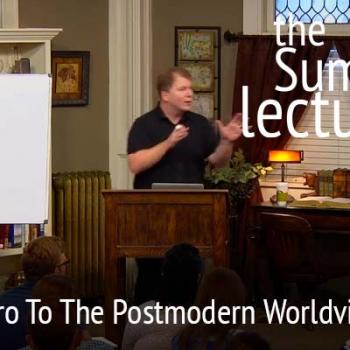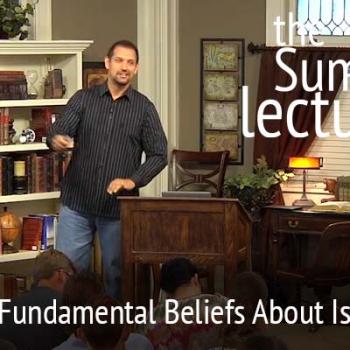
To purchase the entire DVD set of the Summit Lecture Series, visit summit.org.
As a Muslim who had come face to face with the reality that the Bible is trustworthy, I ultimately had to conclude that the Christian position on the Holy Trinity is viable. At the time, I didn’t find it compelling, but I conceded that it was viable.
It was about this time when my Christian friend, David, invited my dad and I to meet his friends, Michael Licona and Gary Habermas.
This was going to be some debate: two of the greatest Resurrection scholars alive today against me and my dad, two devout Muslims!
So, we sat down and began to talk about Jesus’ death on the cross. It then began to dawn on me – pretty quickly – that my position as a Muslim was untenable.
Chapter 4, verse 157 of the Quran teaches that Jesus did not die on the cross.
And [for] their saying, “Indeed, we have killed the Messiah, Jesus, the son of Mary, the messenger of Allah.” And they did not kill him, nor did they crucify him; but [another] was made to resemble him to them. And indeed, those who differ over it are in doubt about it. They have no knowledge of it except the following of assumption. And they did not kill him, for certain.
However, when we look at the historical evidence, it becomes perfectly clear from a variety of Christian and secular sources that Jesus, in fact, died on the cross.
So, as we spoke with Michael, Gary, and my friend David, the case for Christianity was gradually being built… and built… and built.
So much so, that when we began to look at the case for Jesus’ resurrection, it was so strong that in order to explain events around His death on the cross, there is no competing hypothesis AT ALL that explains the data as well as His resurrection.
There simply is none.
The resurrection is the best and only hypothesis concerning Jesus Christ’s death.
So, as a Muslim, I was stuck with the question: What does Christianity need in order to be true?
- Jesus must have died on the cross. If he has not died for our sins, then our sins have not been paid for; and we are not justified before God.
- Jesus must have risen from the dead. If he remained dead, the Christian faith is in vain.
- Jesus must be Lord. In other words, He must have claimed to be God.
If any of these three things are missing, the Christian faith falls apart. And, if all three of them stand, then you can argue about other issues such as evolution, the age of the world, innate morality and other very important questions. But, at the end of the day, Christianity will still be true. So, if someone believes in these three things, but doubts any other Biblical truth, I would be more than happy to sit with them, as two brothers-in-Christ and discuss what the Bible says, Christian-to-Christian.
But don’t take it from me. The Apostle Paul said it much better in Romans 10:9,
“…if you confess with your mouth the Lord Jesus and believe in your heart that God has raised Him from the dead, you will be saved.”
Now, of course there is more unpacking to do around Romans 10:9 and life application, but the absolute truth is that Jesus did claim to be God, died on the cross, and rose from the dead as the sacrifice for our sins.
Even as a Muslim, I had to admit that the arguments for Christ’s death, resurrection and Lordship were incredibly strong!
Then I examined the truth of Islam.
I was certain it had to be 100% true. That’s what I had known my entire life.
So, we looked at the earliest sources on Islam. Now, up to this point, I had read many, many books about Islam. But, they were all written in the 20th century. Putting those aside, I acknowledged that things could have changed between Muhammad’s day and the 20th century. So, instead, we starting examining the earliest writings about Muhammad’s life and the earliest writings of and about the Quran.
I learned that for Islam to be true, only one of two things need to be true. Either:
- Muhammad is a prophet of God. If he, in fact, was God’s prophet then the whole thing is vindicated. OR
- The Quran is the inspired word of God. If God said these things in the Quran, then it must be true.
And one of these vindicates the other. If I can’t prove that Muhammad is God’s prophet, but I can prove that the Quran is the inspired word of God, then that proves Muhammad’s prophecy.
So, I started looking at Muhammad’s life through the earliest sources. And, it became abundantly clear to me that I could not objectively defend Muhammad as a prophet of God.
Secondly, I started looking closer at the Quran. There are five main arguments supporting the Quran as God’s word:
- There are no contradictions in the Quran.
- The Quran confirms and explains the Bible.
- The unsurpassed literary quality.
- There are people alive who are able to quote the Quran from memory.
- Unlike the Bible the Quran has never been changed since it was given to Mohammed.
But, I began to see that each and every single one of them failed to objective scrutiny.
So, at this point, I was distraught before God. I was really hurting. Because, at this point, I realized that my faith had no rational basis to it, compared to Christianity. In fact, in order to defend my faith, I had to be very subjective. I had to begin with the position of “I believe in Islam out of faith, and because I do that I can therefore defend it.” But coming at it objectively, there is no good defense to it.












